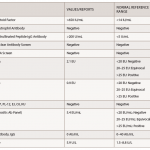 ATLANTA—Patients with rheumatoid arthritis (RA) are known to be at increased risk of respiratory morbidity. However, little is known about chronic respiratory disease as a risk factor for RA.
ATLANTA—Patients with rheumatoid arthritis (RA) are known to be at increased risk of respiratory morbidity. However, little is known about chronic respiratory disease as a risk factor for RA.
“We know RA-specific antibodies, such as rheumatoid factor and cyclic citrullinated peptide, can be generated at sites of inflamed airways. However, whether diseases of chronic airway inflammation, such as asthma or COPD [chronic obstructive pulmonary disease], increase [the] risk of RA isn’t clear,” says Julia A. Ford, MD, a rheumatology research fellow in medicine at Brigham and Women’s Hospital, Boston.
RA Risks Associated with Lung Disease
To better understand these risk factors, Dr. Ford and a team of researchers conducted a large prospective cohort study investigating asthma, COPD and incident RA risk in two prospective cohorts: the Nurses’ Health Study (1988–2014) and the Nurse’ Health Study II (1991–2015). Dr. Ford led a poster abstract presentation at the 2019 ACR/ARP Annual Meeting about this research.1,2
The study also confirmed self-reported asthma and COPD with validated supplemental respiratory questionnaires, and incident RA was defined according to 1987 ACR or 2010 ACR/EULAR criteria, serologic status and date of diagnosis. Study covariates included smoking pack-years, which were self-reported every two years. Subgroup analyses among never and ever smokers and by age were evaluated to understand how asthma and RA risk may be affected by smoking and age.
Study results showed asthma and COPD were each independently associated with an increased risk of subsequent RA, even after adjusting for multiple covariates, such as smoking status, smoking duration and intensity. “Because smoking is such a strong RA risk factor, it was important for us to be able to demonstrate our findings were robust to sensitivity analysis regarding smoking. Indeed, among never smokers, a significant positive association between asthma and RA remained,” Dr. Ford says.
Chronic Mucosal Airway Inflammation
Smoking is a known risk factor for RA. Research suggests the cause may be tied to immune tolerance loss resulting from chronic mucosal airway inflammation that produces RA-related autoantibodies. According to a recent review of current evidence supporting the role of various obstructive lung diseases in RA, Dr. Ford and colleagues suggest that, although the hypothesis that mucosal airway inflammation may increase the risk of developing RA, most studies investigating this relationship have been retrospective and may not adequately address the role of smoking.3
Larger prospective studies are needed to offer stronger evidence for obstructive lung disease and RA risk, Dr. Ford suggests. She says a better understanding of the role of obstructive lung disease in RA pathogenesis could lead to the development of screening strategies with the goal of preventing RA.


